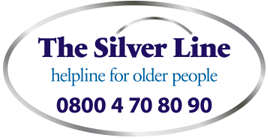Befriending and Telephone Befriending
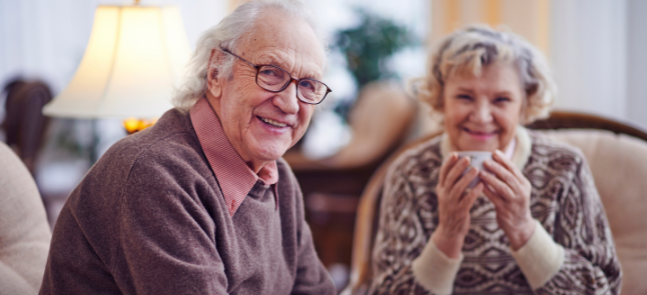
“Loneliness can affect people in very different ways and even if an older person has family and friends, they may still have times when they may feel lonely or are in need of friendship.
"Our befriending services offer older people a chance to share their stories, make a new friend and connect with someone outside their usual social circle.”
- Yvonne Probert, Head of Charity Services
Do you know someone who would enjoy some extra company?
Our Befriending Volunteers offer supportive, reliable friendships to people who would otherwise be socially isolated. Our Befriending Volunteers are empathetic and good at talking and listening. Befriending is fun, safe and easy. Lots of people say these chats are the highlight of their week.
Request a Befriender from us and you can build up and maintain a trusting close relationship over time. Regular social interaction might help you pursue a new direction in life, open up a range of activities, and build confidence. Your one to one relationship will be supported by us.
You can request someone to visit you at home or, you might prefer someone to telephone you.
If you want to grow a new friendship, just give us a call and we will start the ball rolling.
Home Visit Befriending Service
If home visits are for you, please ring Beverley on 07974 184 813.
Volunteer befriender Nicola said, "There’s only one thing better than a cup of tea, and that’s two cups of tea."
Telephone Befriending Service
If telephone calls are for you, please ring Carole on 07811 764 358.
This service is a weekly call arranged to a time which suits the volunteer and befriendee. It is a social chat, to help relax, connect with the community and have a laugh. The coordinator will provide regular phone calls to review the service and chat about any concerns.
 Telephone Befriending is supported by The National Lottery Community Fund.
Telephone Befriending is supported by The National Lottery Community Fund.
If you you prefer evening and weekend chats
The Silver Line helpline is the only UK-wide, 24/7 confidential helpline for lonely, older people. It is for those who would like a “friendly chat”. The service has helped create thousands of new friendships, and many people say their calls are the highlight of their week. You don’t need to be feeling lonely (though if you are, we’d like to help), and you don’t need to live on your own and its FREE on 0800 4 70 80 90. Sometimes it’s just nice to talk.
The Silver Line is not an information and advice line helpline, but will signpost you to your local team here at Age UK North Tyneside, Tel: 0191 280 8484.
The Silver Line helpline is in partnership with Age UK and refers callers through to local Age UKs and other services, depending on any need identified in the call.
Some of our befriending stories
Befriending case study - Sandra's story
Sandra, now retired, became a befriender at the start of 2021. She and her daughters speak every day. She has a busy lifestyle, walking her dog Frankie, gardening, reading and watching movies.
It was her New Year’s resolution to help people in North Tyneside who might be lonely by providing some extra company. Having lost her husband a year before, Sandra understood how we can all feel lonely and wanted to share her time to help others.
Right from the start, Sandra was passionate about befriending and our two North Tyneside customers who she is in regular contact with agree. One said they were “blown away by her warmth and enthusiasm”.
Sandra believes that showing kindness and talking with people, who might feel isolated can make a big difference to how they feel “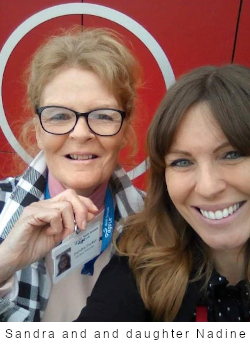 and it’s such an easy thing to do”.
and it’s such an easy thing to do”.
Keen to raise awareness about befriending during kindness monthSandra asked us if she could speak at the first school where her daughter Nadine works. Age UK North Tyneside are big supporters of intergenerational projects, so we obviously agreed.
This is Sandra’s story of how the day went……
“A huge computer screen displayed ‘Age UK North Tyneside’s Befriending Service’. The school children were sat attentively in their assembly. Nadine (my daughter) introduced me as a special person from the service. We then had a little bit of fun. Nadine asked the children if they could guess who I was. Nadine said “I have lived in the same house as our visitor for a lot of years”. Hands shot up – “It’s your mum!”
After explaining what a volunteer does and the meaning of the word, Nadine then invited me to chat to the children. The importance for me was to find the link between talking about my role and also keeping it personal to them.
The school has been awarded the School of Character Kitemark. This is awarded to schools who can demonstrate that they take an explicit, planned and reflective approach to the cultivation of positive character qualities in their pupils, to enable them to grow, flourish and achieve.
The monthly theme was kindness, so this was my first link to the children and my volunteer role. I chatted with them about them seeing anyone looking lonely in the playground (heads were nodding and hands went up) and if so, would they befriend them?
Should they talk to them? Should they listen to what is said? If that person didn’t want to talk, then what would they do? The answer was heart-warming, “We would try again tomorrow”. At this point I spoke about my volunteer role of talking to people who are feeling lonely and isolated.
I then involved them by talking about how they were feeling during lockdown, away from friends and school, Grandmas and Grandpas etc.. They affirmed this with bowed heads and sad faces. I thanked the children who had written letters to local, older people and told them how important and special those letters would have been.
My next link was listening and learning, which is so important as a befriender and equally as important in school. Nadine asked if anyone had any questions to ask me, to which a little girl in the front row said “Is Mrs Fielding older than you?” Needless to say I smiled gratefully and offered a silent thank you.
A boy then asked how I was with technology, to which I replied “Not good but learning”. He followed by asking if I had a mobile when I was young. “No”, I replied, “but I did have a telephone with a dial on it, and a very small television”.
On reflection Sandra said that it had been an “honour to share the idea of befriending with the children”. The children remembered, in a safe, supported place, how lonely lockdown was for everyone. They were introduced to the idea of volunteering and understood how acts of kindness were special moments, for any of us feeling lonely.
To learn more about Befriending Services, contact Age UK North Tyneside on 0191 280 8484 Option 1 or email enquiries@ageuknorthtyneside.org.uk
Befriending case study - Caroline and Ada
Ada is a very friendly, gregarious lady who is 92 years of age and lives in Backworth. Before she retired to care for her husband, Ada was an independent book-keeper for several businesses in North Tyneside. She was a passionate crafter knitting, embroidering and sewing until she was no longer able to due to declining vision.
Ada lives alone and has reduced mobility. Family and friends do live nearby, but Ada is often frustrated that she can’t go anywhere in that moment when she would like to put on a coat and just go out. Luckily she is extremely competent with technology. She has a smart TV and uses Alexa to access music, programmes and information.
Following a series of falls in 2019 Ada requested a volunteer befriender to visit her on a weekly basis at home. Trying hard to be stoic, when Ada first made the request she said sometimes she was “really frustrated with the four walls.”
When Age UK North Tyneside’s Befriending Co-ordinator Beverley Swan first met Ada she said “I haven’t been out of the street on my own for the past five years”.
The Befriending team introduced Ada to volunteer befriender Caroline in October 2019 and they’ve been firm friends ever since. On the second anniversary of their friendship, Ada and Caroline wanted to share their story to highlight the benefits for everyone concerned and to encourage others to consider befriending.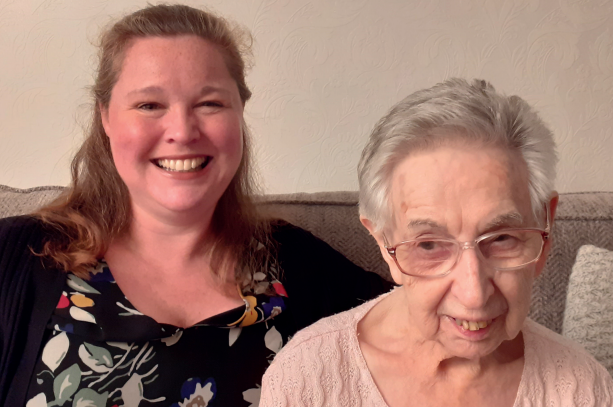
Ada said “We have a laugh together every week, Caroline is lovely. Good company is important. That’s what you want when you can’t get out.”
Caroline said “I look forward to visiting. Ada is really entertaining and makes me giggle!”
Caroline said to Ada “I love learning about your memories of local places in their heyday, it’s really interesting. I also love that you’re fiercely independent and determined to be positive every day.”
Ada remembers how she felt in 2019 when it was hard to ask for help for the first time and said “I would say now, just ask! It’s those little things that make such a difference in your life, someone coming in to see you.”
Caroline has volunteered as a Befriender with Age UK North Tyneside for 5 years and fits this around her family life. She said “Visiting Ada is a welcome change of pace in my day, it’s a quiet moment in a busy week and a really nice thing to do.”
Ada said “Caroline’s a canny lass. I’ve already bought Caroline a present for Christmas. I know I don’t need to but I have anyway.”
Ada wanted to share a funny story, typical of the ones which make Caroline giggle. “I was in bed and asked Alexa to turn out the light for the evening, and Alexa started going on and on about lighthouses!” Ada said “Alexa’s not that clever you know.”
If you are interested in Age UK North Tyneside’s Befriending or Telephone Befriending Services, give us a call on 0191 280 8484 Option 0 or email customer.services@ageuknorthtyneside.org.uk
Befriending case study - 'Gadget Queen' Maureen and Gary
Maureen is 67 years old and lives alone following her husband’s stroke. Her husband moved into a residential care setting and prior to this they had led an active life together playing snooker competitions across the country.
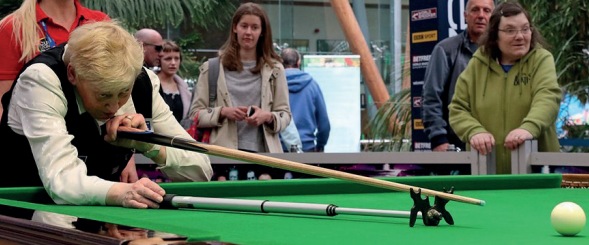
She had been originally introduced to snooker by the Chairman of the disability sports group in 1996 and met her husband when his business agreed to sponsor her on the Ladies Tour.
They participated in numerous competitions and this resulted in them winning the 2010 World Championships. The couple had been fortunate enough to meet many of the leading snooker legends along their way. She was a loyal supporter of the World Women’s Snooker Tour for over 15 years.
Alongside major ranking events, Maureen also competed in several side events including senior’s competitions, reaching eight finals.
Known as the ‘Gadget Queen’ for her wide range of cue adaptations, Maureen also competed on the World Disability Billiards and Snooker Tour.
Maureen appeared in the Evening Chronicle at the time to comment on the fact that some snooker halls would not accept female players. She was runner up in the North Tyneside Sports Personality of the Year award.
During the lockdown period Maureen had become more isolated from her friends, family and her fellow snooker players and was referred to the Age UK North Tyneside Telephone Befriending service.
The co-ordinator took great care in matching Maureen with a volunteer befriender who had a personal interest in sport. Although at first their conversations were quite “reserved” Maureen says they quickly struck up an ongoing friendship.
Maureen says “We have a good laugh, Gary’s a canny lad. I look forward to our calls and would definitely recommend the service to others”. She feels as a result of the befriending services that she is becoming more confident again and is beginning now to get out and about. She’s able to visit her husband again and this she really looks forward to.
Maureen’s volunteer befriender Gary is a full time primary school teacher who relocated to the North East from Norfolk 12 years ago. During the initial lockdown Gary felt that he wanted to give something back to his local community and so considered volunteering.
He says that befriending fits in with his busy schedule but in the future he’d consider face to face volunteering too. Gary said “My befriending coordinator Carole is very supportive of Maureen and I and checks in regularly with us both to make sure that everything is continuing to go well”.
To find out more about the telephone befriending service available from Age UK North Tyneside, or to ask about volunteering with the service, call us on 0191 280 8484 Option 1 or email enquiries@ageuknorthtyneside.org.uk
Befriending case study - Gerry, Carole and Angela
Gerry Robinson 81, retired Aircraft Engineer, is an experienced Volunteer Befriender with Age UK North Tyneside.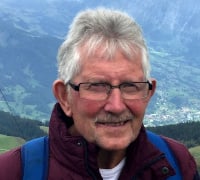
Supporting befriendees in our community since 2015, Gerry usually visits befriendees in their home environment to help reduce their social isolation and loneliness.
When the nation entered lockdown in March 2020, Gerry recognised that it was going to be tough for us all and many of us might lose our confidence as the weeks progressed.
Gerry wanted to help and offered to telephone two of our customers regularly, building strong trusting friendships over time.
Gerry believes that sharing happy memories helps us all to maintain our confidence and self-esteem.
He said
“I try to help by taking Carole and Angela* back to the happiest times in their lives. We re-enact them together, and as I am 81 and have some experience of life, I can engage and empathise with them on so many topics.
They actually chuckle and laugh a lot as we draw back the curtains of time and walk through the portals of memory to their earlier days of joy and happiness.
Luckily, memory plays good tricks sometimes, and they remember the lovely times with their husbands and children. Looking back it seems their children rarely misbehaved and how they all laughed so much, and of course the sun then seemed to shine almost every day.”
As we approach the end of the year, Gerry’s friendship has made a difference. Gerry said “When we discuss these things, I can feel them becoming stronger and most importantly, more confident.
And, of course, through bringing happiness and laughter to Carole and Angela it is also impacting on myself. My daughter, who is a paramedic, and spends her life rescuing and helping other people has noticed the change in me. It is a change for the better brought about by listening and sharing experiences.”
Befriending Coordinator Beverley Swan agrees. “Studies show that the benefits of having a befriending relationship result in positive outcomes for everyone. Being part of the community, doing something meaningful, helping others and perhaps trying something new, makes everyone’s confidence grow.”
Gerry has also taken the time to write this inspiring letter, describing how he has approached the telephone befriending role and encouraging others to do likewise.
To my surprise I found this new role to be very easy and very rewarding both to my befriendees and to myself. Both of the ladies that I ring are in their 80s and 90s and they experience real bouts of loneliness. I relieve their burden three ways.
Firstly, I keep them talking as much as possible, only interrupting when I think it’s necessary to keep conversation going. I believe that one of the primary dangers of loneliness is not being able to talk to someone. After a while they lose the odd word and then, a few months later, the odd sentence of expression. This, along with a growing loss of memory leads to a fear of conversation itself. This in turn leads to a withdrawal from human contact. This will of course lead to even more intense loneliness. I believe the way to slow down this terrifying process is to encourage the befriendee to talk as much as possible during these half hour sessions.
Secondly, I try to help by taking Carole and Angela back to the happiest times in their lives. We re-enact them together, and as I am 81 and have some experience of life, I can engage and empathise with them on so many topics. They actually chuckle and laugh a lot as we draw back the curtains of time and walk through the portals of memory to their earlier days of joy and happiness. Luckily, memory plays good tricks sometimes, and they remember the lovely times with their husbands and children. Looking back it seems their children rarely misbehaved and how they all laughed so much, and of course the sun then seemed to shine almost every day.
But we also remember the difficult times – the war; the fear for loved ones; the bomb shelters; the food rationing. Walking sometimes long distances to school, sometimes in terrible weather. Walking through a cold house with only a candle to light the way. Getting into freezing beds in the winter – I could go on.
In the distance of time we laugh so much about these things, but, by bringing up the topic, I can highlight some of the good things that are happening to them now. Security in their homes; central heating; financial safety net through the welfare system; the luxury of the car; flights abroad; the internet; the mobile phone; and of course TV and radio. So many good things.
When we discuss these things, I can feel them becoming stronger and most importantly, more confident. And, of course, through bringing happiness and laughter to Carole and Angela, it is also impacting on myself. My daughter, who is a paramedic, and spends her life rescuing and helping other people has noticed the change in me. It is a change for the better brought about by listening and sharing experiences.
Thirdly, I don’t argue or criticise my befriendees. I let them unload their cares and worries onto me. After a week on their own they need to express their loneliness and fears. Instead of disagreeing, I let things ride, keeping the conversation going with expressions such as – I take your point, I agree, I’m sure you are right and, that’s a good point. This way they can be confident to keep talking, knowing there will be no confrontation only quiet understanding.
And finally, because of the changes for the good that this befriending has brought about, I would ask and recommend anyone, whatever age you are, to join me in this rewarding journey. All you need to do is pick up your phone and ring 0191 2877013
By doing this you will be helping lonely old people, and helping Age UK North Tyneside in the vitality important and wonderful work that they do.
*Some names have been changed to preserve confidentiality.
Befriending case study - Dianne and Vivien
Vivien is 84 years old and lives alone. She was married to her husband for over 40 years and they had lived in the area all of their married life. Sadly he passed away 13 years ago and she greatly misses him.
Vivien still has regular contact with her stepson, nephew, grand daughter and grand son who have helped her during lockdown with grocery shopping. Sadly she recently lost her beloved cat and as a result was feeling very lonely.
Vivien has mobility problems and struggles to get out and about. Following a hospital admission it was suggested that she consider the telephone befriending service.
Dianne is a 65 year old retired social worker and manager of 30 years. She has lived in North Tyneside for 34 years and previously worked in social care. On retiring, her last position as Development Officer for Older Peoples Services at Gateshead Council she knew that she wanted to volunteer and get involved with befriending.
Dianne had worked for Age Concern Newcastle (1980-81) as a Voluntary Visiting Organiser and had worked with older people all of her life and knew the value that this kind of service provides.
Dianne said “I have been a volunteer with various organisations in the community including being a Director of my own social enterprise for about 4 years and being a Public Governor for Northumberland, Tyne and Wear Mental Health Trust.
When I retired, I was very aware of how isolated older people can become. Especially with families becoming much more mobile now and sons and daughters going to university and settling in different parts of the country.
That was my own experience as I was originally from Cumbria and came over to this area as a student and likewise, my own son went away to university and subsequently lived in London for 7 years.
I wanted to continue with volunteering and there was no better way than by giving my time to an older person who was feeling isolated.
Initially, I was meant to be taking the person out or visiting at their home on a befriending basis for an hour per week but just as we were about to be introduced, the pandemic and the first lockdown happened”.
Age UK North Tyneside matched Vivien with Dianne in April 2020 and it was agreed they’d have chats every week. These continued throughout the pandemic and they’ve not missed a single week.
Their conversations usually last for an hour as they have so much to chat about and have both say that they enjoy a good laugh. Vivien has said the calls from Dianne “really cheer me up and have helped me get through the isolation”.
Dianne said “We have never met and don’t know what each other looks like but we have become good friends and look forward to our weekly conversations. Quite often we have a good laugh and I think we both come off the phone feeling better and uplifted as a result”.
The ladies say that they are both excited at the prospect of meeting up and going for coffee and trips out together. They hope to become independent from the befriending service to continue their friendship when and where they wish to go.
For anyone hoping to either volunteer or take up the telephone befriending service Dianne would encourage this. She feels that it alleviates some of the feelings of loneliness and isolation in the older person, can form strong friendships, that there is a real sense of doing something very worthwhile and can strengthen feelings of community spirit and engagement.
Befriending case study - John's story and poem
People often ask us what it’s like to volunteer. Befriending Coordinator Beverley Swan asked Volunteer Befriender John Dodds to help us answ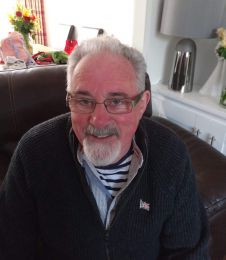 er the question.
er the question.
John, 75 from Wallsend, joined Age UK North Tyneside in January 2020 to visit isolated older people in their homes, providing much needed face to face friendship. Due to COVID-19, John had to stop visiting customers in their homes and instead began Telephone Befriending instead. When lockdown ends and it is safe to do so, John will be switching back from telephone calls to home visits, with our support.
John’s interests include, local & military history, gardening and, as you will soon find out, poetry. Volunteering appealed to John because he felt it was “an ideal way to give back to the community”. Everyone offers their time for different reasons. John said, “Becoming a Volunteer Befriender gave me a new outlook on life and a new challenge. I’m very comfortable in the role”.
It’s easy to volunteer and we welcome people with a wide variety of experience. John agreed, “You don’t need lots of qualifications to do this. If you like people, it’s something you can do.”
When our volunteers need support, we’re there for them too. John sums it up like this, “There’s a good support element from you and I appreciate it, the fact that you get in touch every month. It’s good to know that I can ring you any time as well, if I need to talk something through.”
‘Geordie’ John has written a verse about befriending with Age UK North Tyneside. We love it and hope you enjoy it too. John ended our chat by saying, “We all have little gifts. All you have to do is find your story.”
Noo Geordie waas a canny lad
and he worked hard evory day
He’d aalways been a grafter
It waas the Geordie way.
But when his time come to retire
whey Geordie was at a loose end.
Didn’t knaa what to do with hissel
until he met a friend.
She said why not become a befriender
a volunteer with Age UK
You can use your love of people
To help others along the way
Geordie thowt it a great idea
so he applied and got a start
Just phoning housebound people
and having a good old heart to heart.
Aye Geordie’s really a much happier man
since he joined with Age UK
And the time he spends, talking with new friends
really brightens up his day
It’s great being a befriender
being of use to those around
I’ve got this beat, I’m not obsolete
When there’s so many new friends to be found.
By John E M Dodds
Befriending case study - Sarah
About the person
Sarah, 54, lives with MS and a heart condition. Her physical mobility varies. After losing her partner
in 2019, Sarah lives alone. She has artistic talents: she used to be a florist and also loved crafting.
What was the situation?
Sarah developed Rapid Onset Cataracts in 2020. Sarah quickly lost her sight and was unsure if she would be able to access her community easily in the future.
Nine months into the 2020 coronavirus lockdown, Sarah reached out for an Age UK North Tyneside befriender, hoping some support would help reduce her social isolation and maintain her confidence.
Sarah also believed that a warm and friendly chat from a reliable and trustworthy person, might distract her from all the changes she was struggling to navigate through.
What did Age UK North Tyneside do to make a difference?
The home visit befriending service was able to match Sarah with a volunteer with shared interests.
Sarah’s befriender was hand-picked by us to meet the support Sarah knew she wanted and needed.
Firstly, the volunteer wanted to help our customers to maintain their social skills and confidence,
rather than be a recipient of help. Secondly, the volunteer understood that it was important to still
try and have fun, more so during hard times.
Sarah’s volunteer rings regularly until she can visit.
What outcomes were achieved?
For the customer – increased confidence; fun; shared interests. The customer is so impressed by
the service that she is now training to be a volunteer befriender.
The customer during this time has also completed surgery to both eyes, restoring her sight. She is
delighted.
Feedback from the customer
When unable to see…
“I cooked myself a Christmas dinner, I don’t know how I did but I was determined. I told myself,
I’m not going without my Christmas dinner. It was a bit burnt but it was beautiful.”
Early days in the befriending relationship…
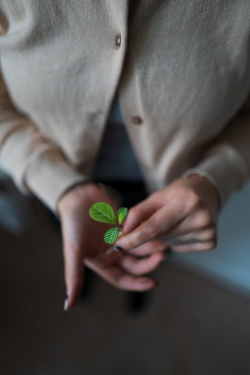
“We talked about plants because we both have gardens. Our conversations lifted my day. I’d get up and wonder what to do because I couldn’t see the television. With encouragement, I'd get on with seedlings and do what I could do. Half of them died but it didn’t matter, I was doing something positive.”
Befriending support generally…
“I’ve met a lovely lady. She’s always full of life and always so happy. On the days when I felt the cup was half empty, she helped me to see that the cup was half full.”
“On the day of my call, I get up a couple of hours in advance because I’m really looking forward to
it. We talk about family. We talk about our dogs. My volunteer has inspired me to do things, she’s
really good fun too and we have such a laugh!”
“You’re not alone. You know you have someone to talk to and it’s built my confidence and lifted
me so much! This is why I’ve decided to put something back and apply to volunteer.”
Now able to see….
“I feel a lot better and a lot brighter because I can see. I even like dusting at the minute. Wow! I’m back to reading magazines again, so I bought loads, I almost cleared the shop!”

